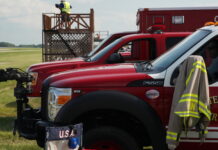In baseball and football, there is a common mistake known as, “taking your eyes off the ball.” It’s a common error that can lead to very unfavorable results. In baseball, batters must track the ball from the pitcher’s hand to the bat. On the football field, a receiver must “look” the ball into his hands before looking up field. In either case, failure to do so generally ends in failure. As we begin to look to the 2013 ICAS Convention in Las Vegas, it is important to not lose focus on the mission at hand. There are still several weeks remaining of air shows across North America, and it is critical to double our efforts to be alert and focused on the task at hand each week until the planes are finally parked and the crowds have gone home.
It is important for the entire air show industry to keep our eyes on the ball, and we have a few ideas for how you can maintain your focus through the home-stretch of the air show season:
1. Fill out an Individual Risk Management worksheet. You can print one off here. Giving oneself an honest, critical assessment can help you identify stressors that could negatively impact your performance. This form is not just for air show performers, but for any and every person involved with the production of an air show. The more aware that we all become, the easier it becomes to identify potential hazards.
2. Remember your Sacred 60 Minutes. If you are a performer, you should force yourself to take the entire 60 minutes prior to your performance to clear your mind of distractions and focus on your individual performance. Visualize your routine. Check over your aircraft. Do whatever it is that you always do prior to flying your routine. It’s imperative that you provide yourself the time to mentally prepare for the task of your performance.
3. Continue your practice regimen. Yes, you’re flying better now than you were in April. And you may feel that you don’t need to practice as much as you did in April, May and June. But fight the urge to practice less. Take full advantage of every opportunity you have to practice, including the waivers established at the event site prior to show days. Focus on what you might do if one or two specific things go wrong. Don’t just practice flying your maneuvers under ideal conditions; simulate potential emergencies and practice what you would do if they happen at the most inopportune points in your air show performance.
As you prepare for the final air shows of the season, remember to finish strong and keep your eye on the ball. There is still one last push before we all get together in Las Vegas.








